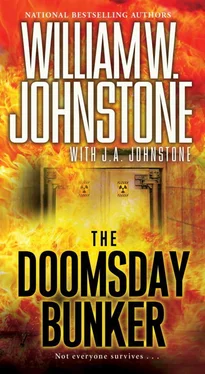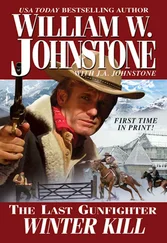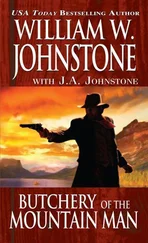Larkin shook his head and put his left hand on Deb’s shoulder as she started to take a step forward. He still held the AR-15 in his right. “We’re staying here,” he said. “Moultrie can come out and talk to us.”
The guards didn’t like that. They were all men that Larkin knew, men he had worked alongside. But there was a subtle difference now, a slightly different cast to their faces. He knew that was because they had all made a decision that put them on the opposite side from him.
Even so, he’d been right about their unwillingness to shoot as long as Deb was with him. One of them ducked back through the doors while the others continued to point their weapons toward Larkin and Crandall.
A couple of tense minutes went by. Then the doors opened again and Graham Moultrie stepped out.
He wore his usual friendly smile as he said, “It’s good to see you again, Patrick. I was hoping to hear your report from the surface under better circumstances, but at least we can move forward from here.”
Moultrie sounded as affable and reasonable as ever, but Larkin knew better now. It was a pose, pure and simple, to get what he wanted.
“Why don’t you let Deb come back over here,” Moultrie went on, “and then you can tell me all about what you found up there.” He looked past Larkin at Crandall and added, “I see you brought a… souvenir.”
“I’m no damn souvenir, mister,” Crandall snapped.
“This is Earl Crandall,” Larkin said. “He’s the one who translated the Morse code for Nelson Ruskin. And he helped us find a tanker truck nearly full of gasoline.”
Moultrie’s eyes widened. “That much gas? That’s wonderful. It’ll keep the generators going for a long time. Assuming you got the parts we need for them, too.”
“Maybe,” Larkin said. “Don’t know for sure yet. But there’s a good chance of it. I’d say the generators and the life-support system are less of a problem now than the food supplies.”
Moultrie’s expression tightened. “That’s not my fault,” he snapped. “I’ve been trying to figure out a way to fix the situation. But the only way—”
“Is to cut down on the number of people depending on those supplies,” Larkin said. “Isn’t that right? And you’ll get rid of the extra folks any way you can, whether it’s booting them out of the project or putting them in the incinerator.”
Moultrie took a step forward and clenched his fists. “Damn you,” he grated. “You don’t know what it’s like, having all this responsibility. Having to decide who has to die so that others can live.”
“Having to be a god, you mean? Since this is the Hercules Project, I guess that would make you Zeus. You’re all powerful, and the rest of us are just puny mortals.”
“If that’s what it takes!” Moultrie shouted as his control began to slip away from him. “I’ve said all along, I’ll do anything I have to in order to protect this project.”
“Even if it means killing everybody, one by one, until you’re sitting down here by yourself, lord of all you survey.” Larkin paused. When Moultrie didn’t say anything, just stood there red-faced and glaring, Larkin went on, “Luckily, you don’t have to do that. I’ve been to the surface. People can live up there, Graham. It won’t be easy, but they can live. Let me take the ones who want to go. That’ll give you some breathing room down here and time to figure out what you want to do next.”
That proposal sounded eminently reasonable to Larkin, but he could tell by the look on Moultrie’s face that he wasn’t going to agree. That would mean splitting up the residents, with him in charge of one group and Larkin, however reluctantly, leading the other. Moultrie wasn’t going to relinquish even that much power.
Moultrie shook his head and said, “I’ve already announced who has to go.”
“Some of them may not want to, and some of the folks you didn’t pick might decide they’d rather take a chance up on the surface. You have to let people decide for themselves.”
“No!” The cords in Moultrie’s neck stood out from the vehemence of his reply. “No, I’m in charge here. I make the decisions. I created this place. I made it happen, nobody else. You’d all be dead without me!”
“That’s true,” Larkin said, “but now it’s time to move on.”
Moultrie shook his head. “Never!” He twisted abruptly and snatched a rifle from one of the guards. “Never!”
“Look out!” Crandall yelled. He started to lift his deer rifle, but Deb turned and grabbed the barrel, lunging against him and forcing the weapon up. Flame spat from the barrel of the rifle Moultrie held as he sprayed shots along the foyer. Larkin heard slugs whine past his ear and threw himself forward. From the corner of his eye, he saw Deb slump against Crandall. A crimson flower bloomed on the back of her shirt.
Then he landed on the floor and the AR-15 bucked against his shoulder as he fired. He squeezed off three rounds, saw Graham Moultrie jolted back as the shots slammed into his chest. Moultrie lived long enough to drop the rifle and gasp, “Oh, God! Deb…”
Then his eyes rolled up in their sockets. He fell to his knees, swayed there for a second, and pitched forward onto the floor.
The guards stared in disbelief. By now Deb had sagged to the floor as well. Her blood stained Crandall’s old army jacket where she had fallen against him. Crandall had his rifle pointed at the guards, and Larkin covered them with the AR-15, as well.
One man sighed, bent over, and put his rifle on the floor. The others set their weapons aside as well.
“I guess it’s over,” one of them said bitterly.
“You’re wrong, hoss,” Crandall said. “I got a hunch the new world’s just getting started.”
* * *
It had been a showdown Patrick Larkin never wanted. But in that split second as he lined his sights on Moultrie and squeezed the trigger, he had realized that it never could have ended any other way. Everybody was the hero of his own story, Larkin had read somewhere, and he was sure Moultrie felt the same way, that he was only doing what was necessary, no matter how many people died in the process.
Time would tell which of them was right, Larkin supposed.
He looked around the basement at the 197 people assembled there, all of the adults and most of the kids wearing backpacks. Many of the adults were armed, as well. All of them had decided to take their chances on the surface. Everyone left down in the corridors and silos and the lower-level bunker had decided to remain. It was a free choice, influenced by no one. Larkin had made sure of that as much as he possibly could.
He’d had a chance to take inventory of the food supplies. He had split it up, 50 percent for the people leaving the project, 50 percent for those staying behind, even though more than half of the residents were heading for the surface. Larkin was confident they would find food up there. As soon as they located a good place, they would plant crops, and they were taking along some of the rabbits and chickens, as well. There would be some lean and hungry days ahead, no doubt about that, but they would make it.
The engineers had replaced the failing parts on the generators, and the project’s gasoline supplies had been replenished from the tanker truck. Larkin and his group would be taking the truck and the rest of its valuable cargo with them, though, because they needed gas for the older, still-working vehicles they had scavenged to make the pilgrimage westward. Right now, those vehicles were fueled up and waiting for them.
Earl Crandall had come from a small town called Cross Plains; that would be their destination starting out. They would move on from there, if and when they needed to.
Читать дальше









